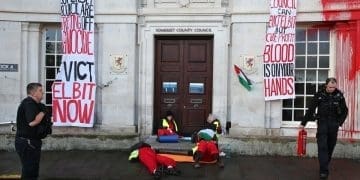Sporadic gunfire rang out in parts of Sudan’s capital, Khartoum, on 25 April. This is despite a US-brokered agreement between the warring generals to cease fire for 72 hours to pave the way for talks on a more lasting truce.
Ten days of heavy fighting, including air strikes and artillery barrages, have killed hundreds of people. Many of them were civilians, and some neighbourhoods of greater Khartoum were left in ruins.
Unconfirmed video posted on social media showed bewildered civilians walking down one street in Khartoum North. Virtually every building was bombed out. Smoke was still rising from the scorched ruins.
However, in other areas there has been a reduction in the intensity of fighting, witnesses said. Foreign governments have scrambled road convoys, aircraft and ships to get their nationals out since the weekend.
However, the UK’s evacuation of its own citizens has been characteristically chaotic. The call first went out to “shelter in place”. Yesterday, it changed, and those who were called were told to make their way to airfields for evacuation. Then, this changed again, to any UK citizens who wanted to flee.
Ceasefire in Sudan?
The Sudanese Armed Forces and the paramilitary Rapid Support Forces (RSF) agreed to the ceasefire “following intense negotiations”, US Secretary of State Antony Blinken said in a statement. It was made shortly before the truce took effect at midnight.
Previous bids to pause the conflict failed to take hold. However, both sides confirmed they had agreed to the three-day halt.
The RSF tweeted:
This ceasefire aims to establish humanitarian corridors, allowing citizens and residents to access essential resources, healthcare and safe zones, while also evacuating diplomatic missions.
In a statement on Facebook, the army said it would abide by the ceasefire on the condition that its rivals did so.
The RSF accused the regular army of breaking the ceasefire by keeping its aircraft in the skies over Khartoum. The aircraft are one of the key advantages the army has over the paramilitary forces. They were used to carry out devastating strikes over the past 10 days.
‘Edge of the abyss’
At least 427 people have been killed and more than 3,700 wounded, according to UN agencies. More than 4,000 people have fled the country in foreign-organised evacuations that began on Saturday.
UN chief Antonio Guterres on Monday warned that Sudan was on “the edge of the abyss” . He added that the violence “could engulf the whole region and beyond”.
The fighting has pitted forces loyal to army chief Abdel Fattah al-Burhan against those of his former deputy Mohamed Hamdan Daglo, who commands the RSF.
The military toppled Bashir in April 2019 following mass citizen protests that raised hopes for a transition to democracy. The two generals seized power in the 2021 coup, but later fell out, most recently over the planned integration of the RSF into the regular army.
The RSF emerged from the Janjaweed militia that then-president Omar al-Bashir unleashed in the Darfur region two decades ago. This lead to war crimes charges against Bashir and others.
Additionally, experts have long drawn links between the RSF and Russian mercenary group Wagner. Blinken earlier on Monday voiced “deep concern” that Wagner risked aggravating the war in Sudan.
The Forces of Freedom and Change were the main civilian bloc, which the two generals ousted from power in a 2021 coup. They said the truce would allow for “dialogue on the modalities of a permanent ceasefire”.
Emergency operations
Nations across the world have launched emergency operations to bring to safety their own Sudan-based citizens. Britain itself has requested an emergency UN Security Council meeting on Sudan.
However, millions of Sudanese are unable to flee the country. They are trying to survive acute shortages of water, food, medicine and fuel. Additionally, they are suffering from power and internet blackouts.
Shortly after the ceasefire took effect, Britain announced it had launched “a large-scale evacuation” of its citizens trapped in Sudan.
Britain had faced pressure to act after comparisons to the chaotic evacuation of Britons after Afghanistan’s Taliban took control of Kabul in 2021.
Britain already carried out an operation on 23 April to withdraw its diplomats. But, citing the dangers on the ground, it had held off on extracting its citizens more widely, despite Western allies evacuating hundreds of their own passport holders.
At first, France had to step in to evacuate many British nationals:
No Homes for Sudan scheme, no sign of granting asylum for Sudanese people stuck in hotels & detention… and apparently not even an evac for British citizens. France once again stepping in to absorb our responsibilities. https://t.co/tgJzEYFLN5 pic.twitter.com/Nx9gcSOJuf
— Lou Calvey (@LouCalvey) April 24, 2023
Likewise, there are still no safe routes for other Sudanese nationals seeking asylum to reach the UK – despite the fact that their claims are frequently accepted:
Why are there so many British nationals in Sudan? Because some have family links. Yet there is no safe and legal route to the UK for refugees.
As @refugeecouncil + @barnardos point out, nearly all child Sudanese, Afghan, Eritrea migrants are granted refugee status after arrival pic.twitter.com/etCgesPTed
— Paul Waugh (@paulwaugh) April 25, 2023
Foreign Office minister Andrew Mitchell said over 2,000 Britons had registered with the ministry seeking help.
Additional reporting by Agence France-Presse
Featured image via Youtube/ Channel 4










